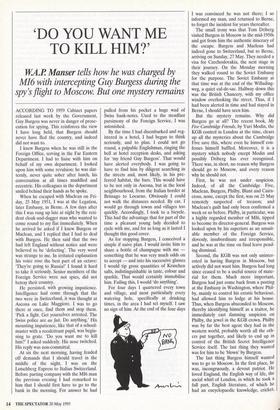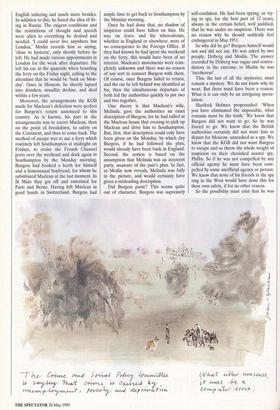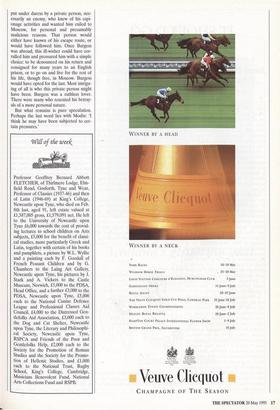`DO YOU WANT ME TO KILL HIM?'
W.A.P. Manser tells how he was charged by
MI6 with intercepting Guy Burgess during the spy's flight to Moscow. But one mystery remains
ACCORDING TO 1959 Cabinet papers released last week by the Government, Guy Burgess was never in danger of prose- cution for spying. This reinforces the view I have long held, that Burgess should never have fled the country, and indeed did not want to.
I knew Burgess when he was still in the Foreign Office, serving in the Far Eastern Department. I had to liaise with him on behalf of my own department. I looked upon him with some revulsion: he was slat- ternly, never quite sober after lunch, his conversation at all times muddled and eccentric. His colleagues in the department smiled behind their hands as he spoke.
When he escaped with Maclean on Fri- day, 25 May 1951, I was at the Legation, later Embassy, in Berne. A few days after this I was rung up late at night by the resi- dent cloak-and-dagger man who wanted to come round to my flat immediately. When he arrived he asked if I knew Burgess or Maclean, and I replied that I had to deal with Burgess. He then said that the two had left England without notice and were believed to be 'defecting'. The very word was strange to me. In irritated explanation his voice rose the best part of an octave: `They're going to Russia!' I found it hard to take it seriously. Senior members of the Foreign Service were not spies, did not betray their country.
He persisted, with growing impatience. Intelligence had come through that the two were in Switzerland, it was thought at Ascona on Lake Maggiore. I was to go there at once, find them and stop them. `Pick a fight. Get yourselves arrested. The Swiss police are au fait. Do anything.' His mounting impatience, like that of a school- master with a recalcitrant pupil, was begin- ning to grate. 'Do you want me to kill him?' I asked suddenly. His nose twitched. His reply was non-committal.
At six the next morning, having fended off demands that I should travel in the middle of the night, I was on the Lotschberg Express to Italian Switzerland. Before parting company with the MI6 man the previous evening I had remarked to him that I should first have to go to the bank in the morning. For answer he had pulled from his pocket a huge wad of Swiss bank-notes. Used to the steadfast parsimony of the Foreign Service, I was astonished.
By the time I had disembarked and reg- istered in a hotel, I had begun to think seriously, and to plan. I could not go round, a palpable Englishman, ringing the bell at hotel reception desks, and asking for 'my friend Guy Burgess'. That would have alerted everybody. I was going to have to find him by diligent searching in the streets and, most likely, in his pre- ferred habitat, the bars. This would have to be not only in Ascona, but in the local neighbourhood, from the Italian border at Brissago to Locarno. Obviously I could not walk the distances needed. By car, I would go through towns and villages too quickly. Accordingly, I took to a bicycle. This had the advantage that for part of the time a pleasant young lady decided to cycle with me, and for as long as it lasted I thought this good cover.
As for stopping Burgess, I conceived a simple if naive plan. I would invite him to share a bottle of champagne with me something that he was very much odds on to accept — and into his successive glasses I would tip gross quantities of Kruschen salts, indistinguishable in taste, colour and sparkle. That would certainly immobilise him. Failing this, I would 'do anything'.
For four days I quartered every town and village, and most particularly every watering hole, specifically at drinking times, in the area I had set myself. I saw no sign of him. At the end of the four days I was convinced he was not there; I so informed my man, and returned to Berne, to forget the incident for years thereafter.
The small irony was that Tom Driberg visited Burgess in Moscow in the mid-1950s and got from him the authentic itinerary of the escape. Burgess and Maclean had indeed gone to Switzerland, but to Berne, arriving on Sunday, 27 May. They needed a visa for Czechoslovakia, the next stage in their journey. On the Monday morning they walked round to the Soviet Embassy for the purpose. The Soviet Embassy at that time was at the end of the Willading- weg, a quiet cul-de-sac. Halfway down this was the British Chancery, with my office window overlooking the street. Thus, if I had been alerted in time and had stayed in Berne, I should have seen him.
But the mystery remains. Why did Burgess go at all? The recent book, My Five Cambridge Friends, by Yuri Modin, the KGB control in London at the time, clears up all the mysteries about the Cambridge Five save this, where even he himself con- fesses himself baffled. Moreover, it is a mystery which nobody except Modin and possibly Driberg has ever recognised. There was, in short, no reason why Burgess should go to Moscow, and every reason why he should not.
First, he was not under suspicion. Indeed, of all the Cambridge Five, Maclean, Burgess, Philby, Blunt and Cairn- cross, none, except the first, was on 25 May remotely suspected of treason; and Maclean's guilt had only been confirmed a week or so before. Philby, in particular, was a highly regarded member of MI6, tipped to become its director-general. Burgess was looked upon by his superiors as an unsuit- able member of the Foreign Service, slovenly, insubordinate and irresponsible, and he was at the time on final leave pend- ing dismissal.
Second, the KGB was not only uninter- ested in having Burgess in Moscow, but actively did not want him. Burgess had long since ceased to be a useful source of mate- rial for them. Much more important, Burgess had just come back from a posting at the Embassy in Washington, where Phil- by, mainly to control his erratic behaviour, had allowed him to lodge at his house. Thus, when Burgess absconded to Moscow, thereby identifying himself as a traitor, he immediately cast damning suspicion on Philby, the jewel in the KGB crown. Philby was by far the best agent they had in the western world, probably worth all the oth- ers put together, and likely to end up in control of the British Secret Intelligence Service itself. The last thing they wanted was for him to be 'blown' by Burgess. The last thing Burgess himself wanted was to go to Moscow. In the first place, he was, incongruously, a devout patriot. He loved England, the English way of life, the social whirl of London, in which he took a full part, English literature, of which he had an encyclopaedic knowledge, cricket, English tailoring and much more besides. In addition to this, he hated the idea of liv- ing in Russia. The exigent conditions and the restrictions of thought and speech were alien to everything he desired and needed. 'I could never live anywhere but London,' Modin records him as saying, `close to hysteria', only shortly before he left. He had made various appointments in London for the week after departure. He left his car at the quayside when boarding the ferry on the Friday night, calling to the attendant that he would be 'back on Mon- day'. Once in Moscow, he shortly lapsed into drunken, maudlin decline, and died within a few years.
Moreover, the arrangements the KGB made for Maclean's defection were perfect for Burgess's return unnoticed to this country. As is known, his part in the arrangements was to escort Maclean, then on the point of breakdown, to safety on the Continent, and then to come back. The method of escape was to use a ferry which routinely left Southampton at midnight on Fridays, to cruise the French Channel ports over the weekend and dock again in Southampton by the Monday morning. Burgess had booked a berth for himself and a homosexual boyfriend, for whom he substituted Maclean at the last moment. In St Malo they got off and entrained for Paris and Berne. Having left Maclean in good hands in Switzerland, Burgess had ample time to get back to Southampton by the Monday morning.
Once he had done that, no shadow of suspicion could have fallen on him. He was on leave and his whereabouts, whether in England or elsewhere, were of no consequence to the Foreign Office. If they had known he had spent the weekend on the ferry, this would have been of no interest. Maclean's movements were com- pletely unknown and there was no reason of any sort to connect Burgess with them. Of course, once Burgess failed to return, and the car he left behind was identified as his, then the simultaneous departure of both led the authorities quickly to put two and two together.
One theory is that Maclean's wife, Melinda, gave the authorities an exact description of Burgess, for he had called at the Maclean house that evening to pick up Maclean and drive him to Southampton. But, first, that description could only have been given on the Monday, by which day Burgess, if he had followed the plan, would already have been back in England. Second, the notion is based on the assumption that Melinda was an innocent party, unaware of the pair's plan. In fact, as Modin now reveals, Melinda was fully in the picture, and would certainly have given a misleading description.
Did Burgess panic? This seems quite out of character. Burgess was supremely self-confident. He had been spying, or try- ing to spy, for the best part of 12 years, always in the certain belief, well justified, that he was under no suspicion. There was no reason why he should suddenly feel endangered in May 1951.
So why did he go? Burgess himself would not and did not say. He was asked by two people, Driberg and Modin. The answer recorded by Driberg was vague and contra- dictory in the extreme; to Modin he was `incoherent'.
This, the last of all the mysteries, must remain a mystery. We do not know why he went. But there must have been a reason. What it is can only be an intriguing specu- lation.
Sherlock Holmes propounded: 'When you have eliminated the impossible, what remains must be the truth.' We know that Burgess did not want to go. So he was forced to go. We know that the British authorities certainly did not want him to depart for Moscow, unmasked as a spy. We know that the KGB did not want Burgess to escape and so throw the whole weight of suspicion on their cherished master spy, Philby. So if he was not compelled by any official agency he must have been com- pelled by some unofficial agency or person. We know that none of his friends in the spy ring in the West would have done this for their own safety, if for no other reason.
So the possibility must exist that he was put under duress by a private person, nec- essarily an enemy, who knew of his espi- onage activities and wanted him exiled to Moscow, for personal and presumably malicious reasons. That person would either have known of his escape route, or would have followed him. Once Burgess was abroad, this ill-wisher could have cor- ralled him and pressured him with a simple choice: to be denounced on his return and consigned for many years to an English prison, or to go on and live for the rest of his life, though free, in Moscow. Burgess would have opted for the last. Most intrigu- ing of all is who this private person might have been. Burgess was a ruthless lover. There were many who resented his betray- als of a more personal nature.
But what remains is pure speculation. Perhaps the last word lies with Modin: think he may have been subjected to cer- tain pressures.'




































































 Previous page
Previous page